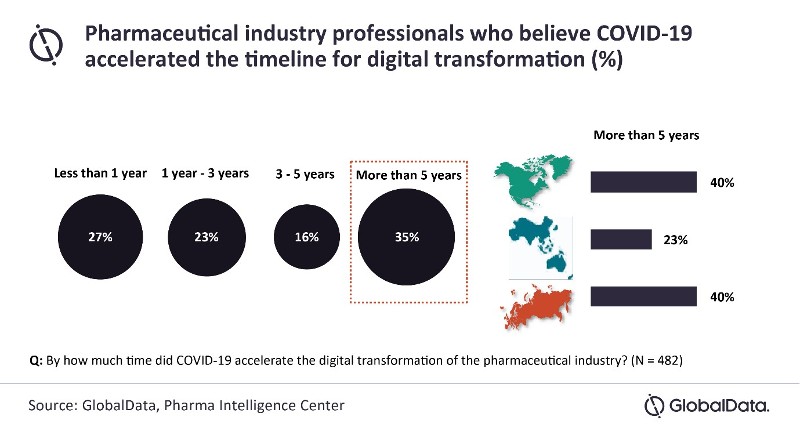Did Covid Quicken Digital Transformation in Pharma sector
COVID has left ineradicable scars on the psyche of the human population, but at the same time it has catapulted the world into the faster adoption of digitalization. Broadly, a part of the life sciences industry, pharmaceutical, healthcare and biotechnology sectors have rapidly been pushed to adopt digital transformation sooner than later. Three vectors that have come into limelight rather vigorously and concurrently are disruption, adoption, and inclusion, which are pushing digital transformation in pharma.
Increased need for Digitalization
Social distancing, immediate lockdowns, and movement restrictions compelled healthcare sectors to shed its conservative stance of digital acceleration, and increase the use of telemedicine, decentralized clinical trials, and digital therapeutic practices. Incumbency towards digitalization in the pharma sector was a result of several factors, which included tax reforms, patent expiries, regulatory burdens, reimbursement concerns, drug pricing, and exuberant R&D costs. However, incumbency had to be rapidly replaced by cataclysmic digitalization, leading to successful adoption of digital tools. Even In pharma sales and marketing models, there has been an increased demand for digital communication tools and online marketing solutions.
Challenges faced before 2020 towards digitalization were pharma companies’ lack of digital readiness, insufficient resources, and traditional mindset. These companies needed to quickly look for rebound methods, and consider deployment of data analytics and digital tools across each business area.
Innovation led Digital Transformation
Several life sciences firms are recognizing the influx of digitalization as more of an opportunity than threat. For instance, big pharma companies like Pfizer, Sanofi, and Novartis have collaborated with Google’s sister concern, Verily, for speeding and improving their clinical trials and processes. This collaboration is speculated to cost over $70 billion in the year 2026.
Companies like Novartis are now keen on developing “smart pills” in alignment with Proteus, a digital start-up- the medicines which come with in-built sensors. The sensors enable doctors to know whether their patients are using therapies properly and with right doses, or not.
Broadly, a range of pharma companies like Merck, Novo Nordisk, Johnson & Johnson, Novartis, and Eli Lilly are heavily investing in a range of joint ventures with digital companies specializing in hospital data, computer chips, drug delivery, and e-commerce.
The pharma industry is reaching beyond the life sciences to hire digital leaders for assisting them in high-tech, retail and other digitally advanced sectors. By harvesting the data and using artificial intelligence the life sciences companies have started to believe that it would be possible to predict the working of molecules, and apparently deadly viruses in advance.
COVID paced up the adoption of digitalization by five years. As many as 35% of the professionals in the pharma industry opined the same in a Global Data research survey. According to their survey, most respondents (i.e. 40%) from North America, and Europe believed that the pandemic was a catalyst of sending the life sciences industry on digital rails, preponing the transformation by five years (Fig1).

Some 82% responses in the survey published by Upadhaya et al. in 2020 show an increased awareness towards telehealth strategies or technologies to be considered for assessment of clinical trials during COVID-19. Around 50-82% responses show the awareness towards current or future responses for implementation of digital technologies and strategies. (Table.1)
| Strategies or Technologies | Percentage of the responses shows the awareness of current or future implementation* |
| Telehealth | 82% |
| Alternative Location of Assessment | 73% |
| Reduced Site Visit | 73% |
| Remote Electronic Medical Records | 73% |
| Shipping Oral Drugs | 64% |
| Virtual Site Visits | 59% |
Conclusion
Radical digital transformation, especially in the pharma sector, is derived from a changing landscape that calls for developing robust COVID tracking infrastructure, Information Systems (IS) technologies, and smartphone apps that can control the spread of the virus, and fast-pace digitalization. With the IT sector becoming the pariah to drive digital transformation, pharma has become the champion of technological innovations to drive this massive overhaul across the world.




